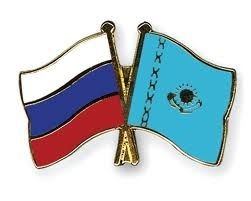NUR-SULTAN (TCA) — The 16th Russia–Kazakhstan Interregional Cooperation Forum focusing on Topical Issues Related to the Development of Cross-Border Cooperation will take place in Omsk, Russia on November 6–7.
The Forum, organized by the Ministry of Economic Development and Roscongress Foundation, will cover a range of the most important topics for both countries. One such topic, themed Kazakhstan and Russia: Digital Transformation, will be discussed at a panel taking place within the Forum’s business programme on November 6. The panel will highlight a major trend of modern life – the integration of digital technologies into every area of human activity, Roscongress Foundation said. Participants of the panel will share their practical experience and discuss the prospects that are opened up for society, the state and private business by the transition to digital technology. The panel’s coordinators are the Chamber of Commerce and Industry of the Russian Federation and the Atameken National Chamber of Entrepreneurs of Kazakhstan.
The panel will be co-moderated by German Klimenko, Co-Chairman of the Council for the Development of IT Technology and Digital Economy at the Russian Chamber of Commerce and Industry, and Bagdat Musin, a Kazakh business leader.
“The identification of best solutions for the fastest and if possible painless adoption of modern technology in every area of human activity is a major focus of the digital transformation of society and a concept that is not new but still relevant today,” said German Klimenko. “Russia and Kazakhstan are both implementing ambitious national programmes in this area, which have already yielded some real results. Over the past several years, communications between the government and citizens have become much more efficient while the public healthcare, services, and transport industries have become much more mobile, convenient and accessible. Our task is to transform all spheres of social life and open up fundamentally new opportunities through the use of modern technology.”
The panel will kick off with a discussion of major government-sponsored projects. Representatives of the Ministry of Digital Development, Communications and Mass Media of the Russian Federation, the Federal Tax Service of Russia, the Ministry of Digital Development, Innovation and Aerospace Industry of the Republic of Kazakhstan, as well as the Russian and Kazakh Health Ministries will speak about key objectives of national digitalisation programmes in Russia and Kazakhstan. The first results of these programs will also be reviewed. Both countries seek to adopt modern technology in most areas of human activity as a major efficiency driver for communications between the government and citizens, and for bringing education, science, healthcare, and living standards to fundamentally new levels. Such ambitious government-sponsored programmes open up great prospects for joint projects.
However, digitalisation offers equally great opportunities to businesses. The panel will be attended by representatives of major players in the Russian and Kazakh IT industries, such as Russia’s Yandex, Rostelecom, IT Cluster of Siberia, and Geoscan, and Kazakhstan’s Kazpochta, Kazakhstan Temir Zholy, Open Technologies Group, Aviata, and IDC Kazakhstan. The market leaders will discuss the operating environment within their respective countries, the challenges faced by new entrants, the specifics of government relations, and initiatives to improve regulation of the IT industry. The panel will also focus on market-entry opportunities in Russia and Kazakhstan and growth potential for new IT projects.









